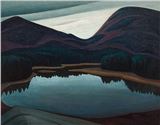Lap-See Lam with Kholod Hawash: Begin Again, Begin Again
Experience the exhibition вҖңBegin Again, Begin AgainвҖқ, where Lap-See LamвҖҷs video installation вҖңFloating Sea PalaceвҖқ meets Kholod HawashвҖҷs textile works. The evocative film draws on the myth of Lo Ting, who is said to be the ancestor of the people of Hong Kong. Several of the charactersвҖҷ costumes are also presented in the exhibition space as sculptural installations.
вҖңFloating Sea PalaceвҖқ (2024) by Lap-See Lam (b. 1990, Stockholm) centres around the myth of Lo Ting, who accidentally summons a Chinese dragon ship and is carried off on a dramatic journey at sea. The shipвҖҷs chef guides us through time and space, as his own story intertwines with that of Lo Ting вҖ“ a tale of heritage, separation and loss, and the search for a home.
Once upon a time, the fish people known as Lo Ting lived in harmony with nature. But they came to be coveted for their flesh, which tasted both strange and familiar. In their insatiable hunger, humans hunted them until only one Lo Ting remained.
Kholod HawashвҖҷs visual stories in quilting
In вҖңFloating Sea PalaceвҖқ, Kholod Hawash (born 1977 in Basra, living in Finland) interprets Lap-See LamвҖҷs story through textile works вҖ“ costumes that are both worn by the filmвҖҷs characters and presented as a sculptural installtion in the space.
Kholod Hawash works in the textile craft technique вҖңjodaleiaвҖқ, which is the Arabic term for quilting or wadding, and вҖңtatreezвҖқ, embroidery. The resulting images depict myths that recur throughout the world, all rooted in a universal yearning to understand human existence.
Kholod Hawash brings together scenes from Iraqi folklore with Mesopotamian and Chinese mythology, combining them with unique motifs inspired by her memories and experiences.

Recommended for you
Experience the exhibition вҖңBegin Again, Begin AgainвҖқ, where Lap-See LamвҖҷs video installation вҖңFloating Sea PalaceвҖқ meets Kholod HawashвҖҷs textile works. The evocative film draws on the myth of Lo Ting, who is said to be the ancestor of the people of Hong Kong. Several of the charactersвҖҷ costumes are also presented in the exhibition space as sculptural installations.
вҖңFloating Sea PalaceвҖқ (2024) by Lap-See Lam (b. 1990, Stockholm) centres around the myth of Lo Ting, who accidentally summons a Chinese dragon ship and is carried off on a dramatic journey at sea. The shipвҖҷs chef guides us through time and space, as his own story intertwines with that of Lo Ting вҖ“ a tale of heritage, separation and loss, and the search for a home.
Once upon a time, the fish people known as Lo Ting lived in harmony with nature. But they came to be coveted for their flesh, which tasted both strange and familiar. In their insatiable hunger, humans hunted them until only one Lo Ting remained.
Kholod HawashвҖҷs visual stories in quilting
In вҖңFloating Sea PalaceвҖқ, Kholod Hawash (born 1977 in Basra, living in Finland) interprets Lap-See LamвҖҷs story through textile works вҖ“ costumes that are both worn by the filmвҖҷs characters and presented as a sculptural installtion in the space.
Kholod Hawash works in the textile craft technique вҖңjodaleiaвҖқ, which is the Arabic term for quilting or wadding, and вҖңtatreezвҖқ, embroidery. The resulting images depict myths that recur throughout the world, all rooted in a universal yearning to understand human existence.
Kholod Hawash brings together scenes from Iraqi folklore with Mesopotamian and Chinese mythology, combining them with unique motifs inspired by her memories and experiences.
Artists on show
Contact details













